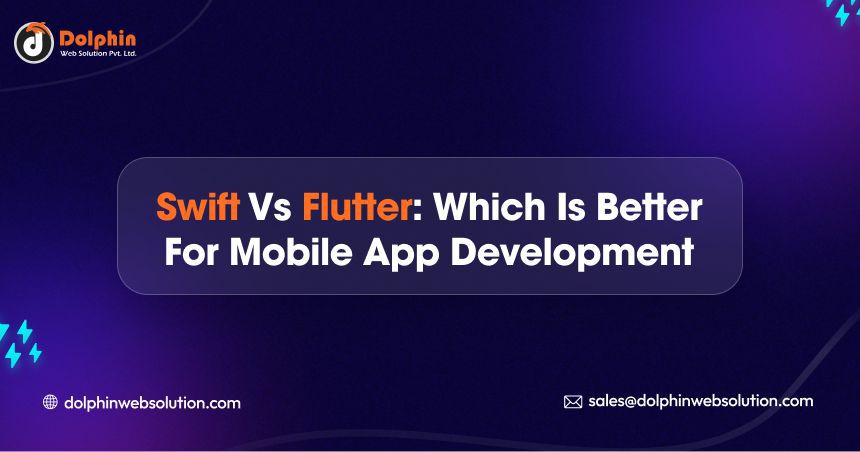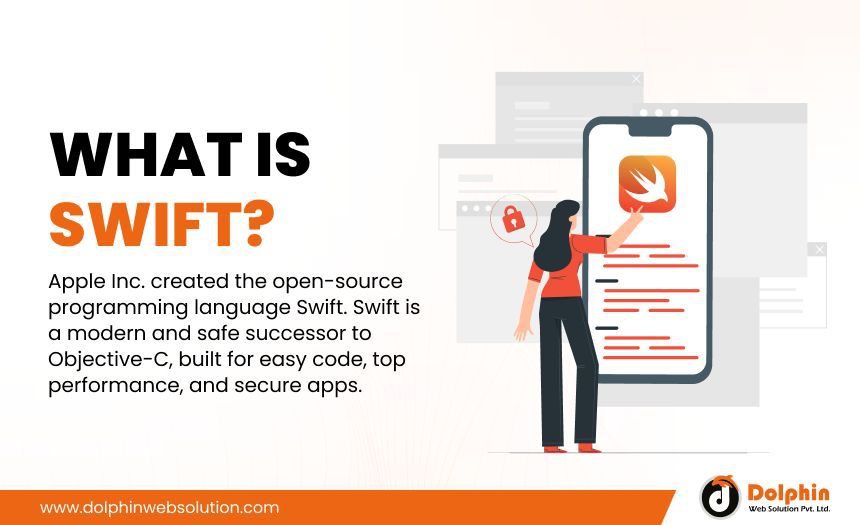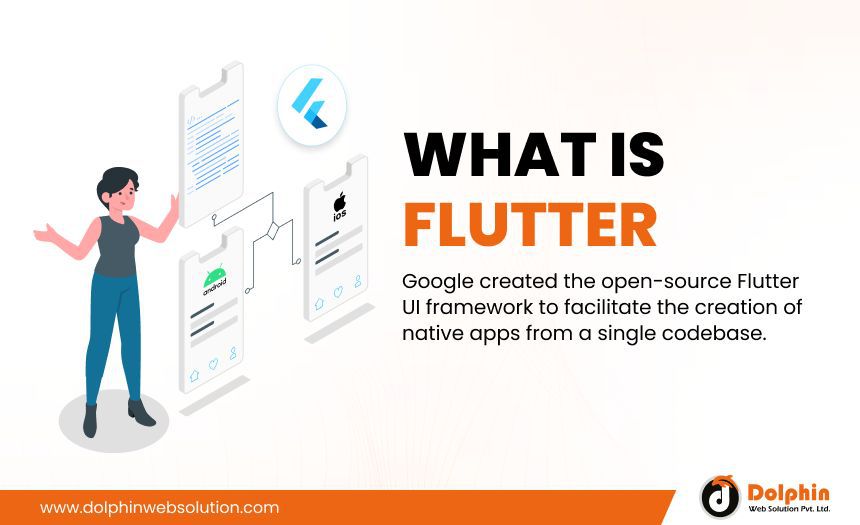Swift vs Flutter: Which is Better for Mobile App Development

Table of Contents
Summary :
Explore our latest blog comparing Flutter and Swift in mobile app development. Uncover the strengths of Flutter's cross-platform versatility and Swift's speed in iOS programming. Make an informed decision for your project with our insightful Swift vs. Flutter analysis.
Every successful application results from careful planning, reliable coding techniques, and the right technological stack. One of the main pillars supporting your company’s mobile app development needs is the programming language utilized to construct the business application. You can hire Flutter developers for getting your IOS app built with full security.
When developing iOS apps, you should equally prioritize the app’s quality, performance, and app store criteria. The programming language in your tech stack must compensate for the needs of an easy-to-use front end and a perfect back end. The iOS programming language is Swift, and the Flutter UI toolkit was created to create slick frontends. Still, there has been a heated competition amongst these languages/toolkits for the attention of developers and a spot in the tech stack. The main characteristics of Flutter and Swift are included in this blog. Additionally, we will compare and contrast Swift and Flutter so you can see which is better and in what circumstances.
Flutter Vs. Swift: An Overview

Apple Inc. created the open-source programming language Swift. Swift is a modern and safe successor to Objective-C, built for easy code, top performance, and secure apps. Perfect for all kinds of projects. Swift development has all the capabilities in current programming languages, plus extras like optional chaining, closure, and generics that make writing code in Swift more versatile.
Key Feature Of Swift
- Swift automatically releases unneeded memory through Automatic Reference Counting, providing practical and safe management.
- Makes dealing with closures and flexible building elements easier, replacing function pointers for increased power and efficiency.
- It allows a function to return several values using tuples, improving the code’s readability and simplicity.
- Swift’s struct type, which combines value semantics with class-like characteristics for understandable and efficient code, allows methods, extensions, and protocols.
- Try/catch/throw syntax in Swift is integrated with built-in error handling, making writing robust code that guards against unplanned crashes easier.
- Its compatibility design minimizes the need for substantial modifications by ensuring that code developed in earlier versions may operate smoothly with future versions.
- Robust debugging capabilities that make finding and fixing code problems easier. These features include interactive debugging using Xcode and LLDB.
Flutter Overview

Google created the open-source Flutter UI framework to facilitate the creation of native apps from a single codebase. With just one Flutter codebase, multi-platform apps can be delivered.
It includes an SDK with every tool required to create an iOS or Android application. The framework’s rich and reusable UI components facilitate the rapid development of interfaces. The computer language Dart, another language supported by Google, is used to create this framework. Since its creation, it has undergone several enhancements and modifications.
Flutter facilitates the easy development, testing, and deployment of apps. You can opt for Flutter Development Service to get your application built on flutter now.
Flutter’s Key Features
- Flutter’s hot reload feature facilitates quick error rectification by rapidly updating the user interface (UI) with updated code, eliminating the need for app restarts.
- With a single codebase for iOS and Android, Flutter simplifies development by sharing UI components with code, cutting down on expenses and maintenance time.
- Using the help of Flutter’s widget library, developers can create stunning and responsive interfaces using pre-built, customizable widgets. Some distinctive designs developers have made are the Cupertino pack and Material Design.
- It is an open-source framework that encourages flexibility and ongoing development. It is free and backed by a sizable and vibrant developer community.
- High performance is guaranteed by Flutter’s natively built applications, which operate at native speeds on both iOS and Android. The simplicity of its connection with external components improves user experiences overall.
Swift Vs Flutter In-Depth Comparison
1. Swift Vs Flutter: Performance
Swift is your most excellent option in terms of speed. Due to its native status, the language may offer unparalleled speed, effectiveness, and fluidity. It expedites the creation of apps, enabling developers to deploy high-caliber mobile applications swiftly.
Flutter uses a pre-compiled Dart garbage collector, developers can rely on it to help them deliver mobile apps on time. As a result, you could speak with the device quickly. Flutter is less effective than Swift if you want your iOS app to be effective.
2. Swift Vs Flutter: User Experience
Swift is an iOS native language, implementing native iOS functionality won’t present any problems. The user experience in iOS app development will be exclusively iOS-style.
Swift is a highly configurable and responsive UI kit framework that displays various elements according to the needs of the application design, including buttons, labels, and more. Furthermore, each UI component must be created by developers from scratch.
Flutter’s UI provides tools and widgets for creating adaptable and responsive user interfaces. Additionally, they may be modified to meet the needs of the application design. First off, Material and Cupertino widgets are popular. Additionally, Flutter’s adaptable layout framework makes it simple for developers to create intricate user interfaces.
3. Swift Vs Flutter: Development Time
The Xcode command line may be used to estimate the development time for Swift native iOS apps. When you complete constructing your application and use the product menu to run the build command, this is where the time appears. Therefore, Swift outperforms other companies regarding time to market. However, Flutter is a superior choice if you must design apps for both platforms.
Flutter provides all it takes to build an app with a single command on the Flutter app. However, creating an iOS app with Flutter could take a little longer than making a native iOS app in terms of performance, especially for clean builds. However, Flutter increased significantly in speed after the initial clean development period.
4. Swift Vs Flutter: Learning Curve
Swift provides a more complex learning environment than Flutter. It might be challenging to learn for developers not experienced with functional programming or developing iOS applications. Since learning, it takes more work and has a more complex development environment than Flutter. Another obstacle to overcome is the extensive and intricate standard library with Swift.
The learning curve for Flutter is quite simple and rapid, especially if you are familiar with object-oriented programming languages like Java or Kotlin. Its comprehensive and in-depth documentation further simplifies learning.
5. Swift Vs Flutter: Development Cost
The price of developing an iOS application will increase if you use the Swift coding language for native app development. Hiring native coders for iOS development may be more expensive than hiring Android engineers.
On the other hand, you may build your team utilizing a range of recruitment techniques at comparatively low expenses if you employ Flutter app developers. Additionally, these developers will collaborate with you to produce cross-platform applications or Android apps (apps that run on both iOS and Android). The price of creating an app will eventually drop significantly. When picking between Flutter and Swift in this particular area, Flutter was the clear winner.
6. Swift Vs Flutter: Cross-Platform Compatibility
Swift lacks built-in cross-platform functionality and is primarily intended for native iOS app development. Although it is excellent at providing smooth experiences for Apple devices, cross-platform interoperability presents difficulties for developers. However, developments in third-party tools and frameworks like SwiftUI. These tools offer a bridge for code exchange between iOS and other platforms, which presents a viable way to use Swift’s abilities in a cross-platform setting, even if they are less complete than some cross-platform alternatives.
Flutter has write once and run everywhere. Beautiful, native apps on iOS & Android. Fast dev, great UX. This emphasizes Flutter’s critical benefits for cross-platform development: single codebase, native performance, rapid growth, and consistent UI/UX.
7. Swift Vs Flutter: Future Trends And Updates
Swift, is continually developing and becoming more powerful. Future Swift updates are anticipated to improve performance, increase compatibility with new iOS versions, and add cutting-edge capabilities in light of Apple’s dedication to enhancing its ecosystem. Swift’s development is community-driven, guaranteeing a steady stream of updates that tackle new products in mobile app development. Because of its focus on security, speed, and contemporary syntax, Swift is well-positioned for future results and is a good option for developers who want to use the newest iOS features.
Flutter is expected to increase in the field of mobile app development. Future releases are expected to solidify Flutter’s status as a top cross-platform solution as the community actively contributes to its progress. It is anticipated that the hot reload feature will continue to be improved, widget libraries will grow, and third-party integration support will be strengthened. Because of its flexibility in responding to new UI/UX trends and dedication to performance optimization on both the iOS and Android platforms, Flutter is a desirable option for developers looking for a flexible and future-proof framework for their mobile app designs. As Flutter develops further, it will probably significantly impact how cross-platform mobile development develops in the future.
When You Use Swift
- As Swift is Apple’s core programming language, use it to create apps just for iOS platforms.
- For iOS applications that require great speed, choose Swift, which offers optimized syntax to ensure a seamless and responsive user experience.
- Choose Swift for applications where Objective-C code already exists since it integrates with Objective-C effortlessly.
- Swift is a great option if you want to write more scalable and manageable code thanks to features found in current programming languages like closures, generics, and protocols.
- Adopt Swift to simplify user interface building with a clear syntax when using SwiftUI for declarative UI development.
When You Use Flutter
- Flutter allows for code exchange across iOS and Android, it’s perfect for developing cross-platform mobile apps.
- Provides a UI that is visually appealing and consistent across several platforms, with widgets that may be customized.
- During development, the Hot Reload functionality makes making rapid code changes and seeing results easier.
- It offers various customization choices, making it appropriate for applications requiring particular branding specifications.
- Provide access to iOS and Android’s native features and APIs for platform-specific functionality.
Conclusion
We hope you now understand the distinctions between Flutter and Swift and the elements to consider while developing iOS apps. Before choosing a technology, evaluating the project’s needs is crucial since each has advantages and disadvantages. In summary, Flutter is a fantastic choice for applications requiring cross-platform development at a reasonable cost & quick development time. However, Swift is a superior option for applications needing enhanced speed, efficiency, and unique iOS-specific capabilities.
Whichever technology you decide on, it’s critical to collaborate with professionals who can offer direction and assistance throughout the app development process. You can Hire Ios app Developers to build iOS apps. Contact Dolphin Web Solution expert, they provide Flutter and Swift mobile app development services. Craft your dream iOS app. Our team builds success.

Hello!
Click one of our contacts below to chat on WhatsApp

